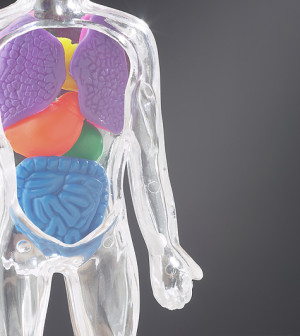- Could Your Grocery Store Meat Be Causing Recurring UTIs?
- Are You Making This Expensive Thermostat Error This Winter?
- Recognizing the Signs of Hypothyroidism
- 10 Strategies to Overcome Insomnia
- Could Artificial Sweeteners Be Aging the Brain Faster?
- Techniques for Soothing Your Nervous System
- Does the Water in Your House Smell Funny? Here’s Why
- Can a Daily Dose of Apple Cider Vinegar Actually Aid Weight Loss?
- 6 Health Beverages That Can Actually Spike Your Blood Sugar
- Treatment Options for Social Anxiety Disorder
Diet Changes Can Alter Gut Bacteria, Study Says


Dietary changes can dramatically alter the balance of bacteria in the gut on a daily basis, according to a new study.
These fluctuations could lead to monitoring systems that might help detect and ease flare-ups for people with certain chronic illnesses, such as inflammatory bowel disease (ulcerative colitis and Crohn’s disease), the researchers said.
Trillions of bacteria live in the digestive tract, but their effect on human health isn’t well understood, the Massachusetts Institute of Technology (MIT) scientists noted.
To better understand the role of bacteria in the body, the research team monitored changes in the bacteria of two people over the course of one year. Stool samples were collected daily to monitor the amount and types of bacteria present.
The participants also used an iPhone app that tracked lifestyle factors — such as diet, sleep, mood and exercise — that could have an impact on their gut bacteria.
Both people experienced an event during the study period that had a significant impact on their gut microbiome, or the number and types of bacteria in their digestive tract.
One developed diarrhea while on a two-week trip to a developing nation. This person had significant changes in the balance of gut bacteria. After returning home to the United States, however, the gut bacteria returned to normal, according to the study published in the July 25 issue of Genome Biology.
Meanwhile, the other participant developed food poisoning from salmonella. As a result, gut salmonella jumped from 10 percent to nearly 30 percent. Moreover, populations of helpful bacteria nearly disappeared. After the person recovered from food poisoning, the beneficial bacteria rebounded to about 40 percent of the total microbiome. But the researchers pointed out that most of the strains were different from those originally present.
“On any given day, the amount of one species could change manyfold, but after a year, that species would still be at the same median level. To a large extent, the main factor we found that explained a lot of that variance was the diet,” study senior author Eric Alm, an associate professor of biological and environmental engineering, said in an MIT news release.
Looking ahead, the researchers said they plan to explore why gut bacteria tend to return to their normal levels after fluctuating widely.
More information
The U.S. National Institutes of Health has more about the human microbiome.
Source: HealthDay
Copyright © 2026 HealthDay. All rights reserved.










